|
 |
 Автор: Williams Автор: Williams
 Дата: 10 июля 2022 Дата: 10 июля 2022
 Просмотров: 5 330 Просмотров: 5 330 |
| |
ТЕХСОФТ mb AEC Ing+ 2021.090
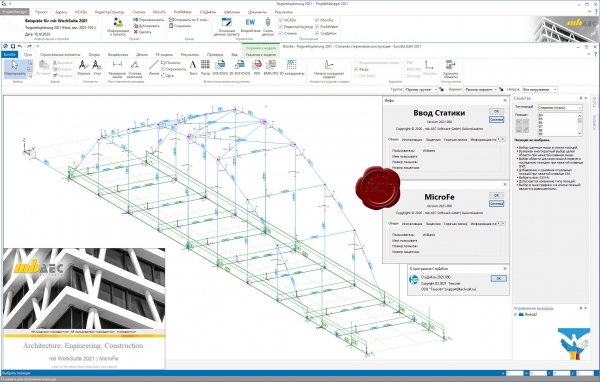
Фирма ТЕХСОФТ занимается разработкой и сбытом программного обеспечения и предоставлением услуг в области расчетов и проектирования строительных конструкций (с использованием пространственных расчетных схем, с учетом сейсмических и ветровых воздействий) Коллективом специалистов, работающих в ТЕХСОФТ, за последние 17 лет был выполнен большой объем работ, связанных с разработкой программного обеспечения САПР, как для немецких фирм, таких как mb Software AG (сейчас mb AEC Software GmbH), Inpro и Siemens (с использованием Европейских строительных норм EUROCODE 2,3 и DIN 1045-1, DIN 18800), так и для внутреннего рынка (с учетом требований российских "Строительных норм и правил" - СНиП) Высокий научный потенциал фирмы, опирающийся на 25-летний опыт работы института ЦНИИпроект в области САПР, тесное взаимодействие с институтами - разработчиками СНиП и Госстроем России, постоянный контакт с зарубежными и российскими пользователями, помогающий учитывать особенности реальных проектов, и использование новейших информационных технологий позволяет фирме ТЕХСОФТ занимать лидирующую позицию среди производителей программных средств для автоматизации расчетов и процессов проектирования в строительстве.
Система Ing+ - современный комплекс программ для проектирования строительных конструкций, сочетающий удобство использования с точностью получаемых результатов, соответствием требованиям нормативных документов стран СНГ и Европы, разнообразием решаемых задач. Данная система является уникальным предложением на российском рынке.
В систему проектирования входят следующие подсистемы:
- ViCADo – подсистема архитектурного и инженерного проектирования строительных объектов с широкими возможностями визуализации.
- MicroFe-СДК – подсистема конечноэлементных расчетов строительных конструкций на прочность, устойчивость, колебания.
- Статика – пакет программ для расчетов и конструирования железобетонных, стальных элементов строительных конструкций, фундаментов и подпорных стен.
- COSTRUC (Сталебетон) – пакет программ для расчетов и конструирования композитных (сталежелезобетонных) элементов.
Единая сервисная программа управления данными ProjektManager для проектирующей системы Ing+ позволяет организовать работу с проектами, архивами, выходными документами, дополнительными материалами, осуществлять связь с другими подсистемами Ing+. Также присутствуют широкий спектр сервисных возможностей (работа с электронной почтой, копирование, перемещение, архивирование разделов проекта и др.). В состав системы также входят дополнительные программы работы с сечениями (Profilmaker), вывода (Viewer) и другие. Присутствие набора сервисных программ позволяет формировать набор выходных документов в виде бумажного документа, электронного документа форматов pdf, rtf и других.
Система охватывает основные этапы проектирования конструкций, обеспечивая передачу данных от одного этапа к другому (ViCADo – MicroFe-СДК, MicroFe-СДК – Статика, MicroFe-СДК – ViCADo, Статика – ViCADo и др.). Наличие связей, предусмотренных на этапе создания подсистем, позволяет избежать ошибок при передаче данных и обеспечить наилучшую (наиболее полную) передачу информации о конструкции. |
| |
 Читать статью дальше (комментариев - 15)
Читать статью дальше (комментариев - 15)
| |
|
 |
 Автор: Williams Автор: Williams
 Дата: 9 июля 2022 Дата: 9 июля 2022
 Просмотров: 689 Просмотров: 689 |
| |
Bentley Promis.e CONNECT Edition Update 10 version 10.10.00.53 ENG x64
+ Chinese Simplified Language Pack
Bentley Promis.e CONNECT Edition Update 8 version 10.08.00.32 RUS x64
online installers
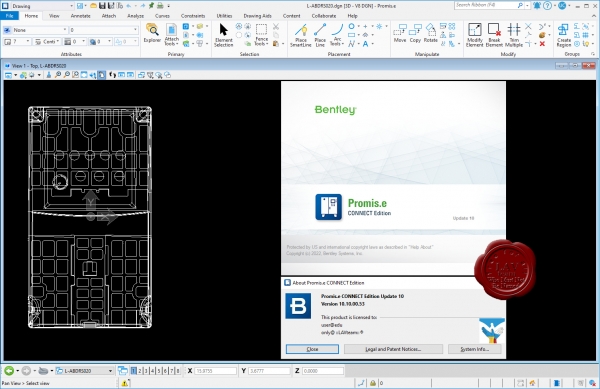
Promis.e is intelligent software for control system design. With Promis.e users can generate electrical schematics, panel layouts, bills of material, wire lists, terminal plans, and more in record time. Promis.e streamlines the design process by performing many tedious operations automatically, including ID assignment, cross referencing, wire numbering, and list generation. These tasks are completed much faster and with fewer errors compared to manual methods. Support for multiple disciplines allows users to include electrical, hydraulic, pneumatic, and process control diagrams in projects. Promis.e runs as a MicroStation PowerPlatform product. |
| |
 Читать статью дальше (комментариев - 5)
Читать статью дальше (комментариев - 5)
| |
|
 |
 Автор: Williams Автор: Williams
 Дата: 8 июля 2022 Дата: 8 июля 2022
 Просмотров: 6 090 Просмотров: 6 090 |
| |
Autodesk Advance Steel 2023.0.1 addon ENG+RUS x64
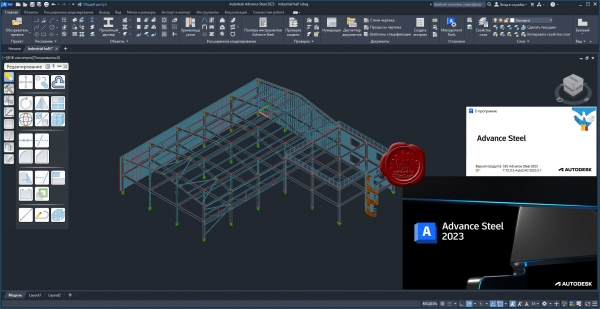
Advance Steel представляет собой приложение для проектирования металлоконструкций, интегрированное в последнюю версию AutoCAD. Модель Advance Steel является основой 3D-конструирования. Она содержит объекты металлоконструкции (например, балки, пластины, болты, сварные швы), а также конструктивные элементы и взаимосвязи объектов друг с другом и позволяет управлять ими. Сложные конструкции создаются с помощью структурных элементов Advance Steel (например, портала рамы или лестницы), которые включают в себя все необходимые элементы, узлы и соединения.
Программа Advance Steel адаптирована для разработки как стандартизированных так и нестандартных конструкций. Она имеет большой набор холоднокатаных гнутых профилей и решетчатых конструкций распространенных производителей (Albion, Ayrshire, Canam Manac, Canfer, Fisher, HiSpan, Kingspan, Krupp, Metsec, SAB, SADEF, Staba, StructuralSections, Ward, Zeta и т.д.). Можно создавать индивидуальные пользовательские сечения и другие элементы и сохранять их в таблицах (библиотеках) для повторного многократного применения.
Преимущества Autodesk Advance Steel 2023
- Информация о статусах и производстве в модели. Создайте свои собственные статусы утверждения в Management Tools и сделайте их доступными для объектов Advance Steel в Диспетчере документов.
- Информация о положении профиля. Автоматическое получение отметки балок или расположения профилей в пространстве на планах в виде метки.
- Настраиваемый символ обрыва. Возможность самостоятельно выбрать дизайн обрывной линии для узлов и объектов, которые не полностью попадают в вид.
- Метки сетки осей. Ручной контроль и изменение расположения меток сетки осей на чертежах.
- Точки привязки анкеров. Этот новый инструмент дает возможность легко образмерить анкерные болты на чертежах, используя аннотативные размеры.
- Шаблоны спецификаций. Новые шаблоны спецификаций для расположения в чертеже.
- Дополнительные стили чертежей. Добавлены новые стили чертежей для разных стран, что позволит повысить продуктивность и скорость выпуска документации.
- Новые узлы для прогонов. Новые автоматические узлы для создания узлов для стеновых прогонов и прогонов по покрытию.
- Синхронизация узлов стальных конструкций. Вы можете синхронизировать узлы стальных конструкций между моделями созданными в Revit или Advance Steel.
|
| |
 Читать статью дальше (комментариев - 18)
Читать статью дальше (комментариев - 18)
| |
|
 |
 Автор: Williams Автор: Williams
 Дата: 7 июля 2022 Дата: 7 июля 2022
 Просмотров: 3 585 Просмотров: 3 585 |
| |
ANSYS products 2022 R2 x64
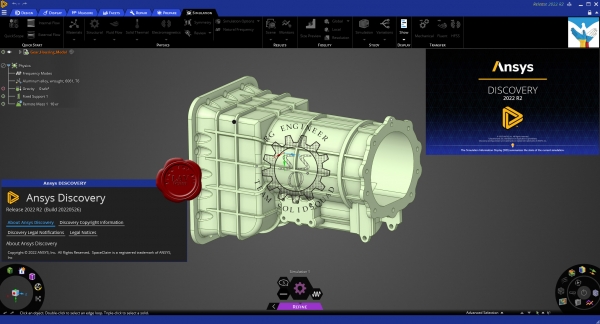
ANSYS - многоцелевой конечно-элементный пакет для проведения анализа в широкой области инженерных дисциплин. Это универсальный, "тяжелый" конечно элементный пакет, предназначенный для решения в единой среде на одной и той же конечно-элементной модели задач по прочности, теплу, электромагнетизму, гидрогазодинамике, многодисциплинарного связанного анализа и оптимизации на основе всех выше приведенных типов анализа.
Сотни новых возможностей ANSYS согласуются с общей стратегией развития компании – разработка универсального и многофункционального программного обеспечения, соответствующего изменяющимся требованиям клиентов. Новый релиз разрабатывался с учетом требований клиентов, активно использующих стратегию ANSYS, которая получила название Simulation Driven Product Development.
Семейство продуктов ANSYS
Professional
Высокоэффективный комбинированный пакет, предназначен для расчета линейных статических задач прочности, модального анализа, стационарных и нестационарных задач теплофизики, включая теплопроводность, конвекцию и радиационный обмен. ANSYS Professional ориентирован на инженеров среднего звена.
Structural
Полный прочностной пакет (за исключением функций расчета гидрогазодинамики, тепла, электромагнетизма), включает функции прочностного анализа, расчеты линейной прочности, нелинейности (деформации, упругость, пластичность, текучесть, расчет элементов на растяжение-сжатие и др.). Контактные задачи. Частотная область динамического анализа (гармонический, спектральный, вибрации). Динамический анализ неустановившихся процессов; устойчивость конструкций; механика разрушений линейных и нелинейных задач для изделий из композиционных и армированных материалов, включая температурные воздействия. Совместный анализ, акустика.
Mechanical
Этот пакет прочностного анализа и тепла (за исключением функций расчета гидрогазодинамики и электромагнетизма) является наиболее универсальным модулем, позволяющим выполнять большинство линейных и нелинейных задач конечно-элементного анализа. Включает в себя все возможности, перечисленные в Structural, в сочетании с функциями расчета тепла (стационарный и нестационарный режимы, теплопроводность, радиация, конвекция).
Multiphysics
Наиболее полный пакет, включающий в себя все возможные физические дисциплины (прочность и тепло), а также электромагнитный анализ (магнитостатика, электростатика, электропроводность, низкочастотный гармонический анализ, высокочастотный анализ) и гидрогазодинамику (стационарная и нестационарная, сжимаемые и несжимаемые, ламинарные и турбулентные потоки; естественная и вынужденная конвекция, сопряженный теплоперенос; вязкие и многокомпонентные течения; фильтрация).
Emag
Специальный модуль расчета электростатики и магнитостатики, низкочастотного и высокочастотного анализа, нестационарных задач.
LS-DYNA
Программа высоконелинейных расчетов LS-DYNA, интегрированная в среду ANSYS, объединяет в одной программной оболочке традиционные методы решения с обращением матриц, специализированные контактные алгоритмы, множество уравнений состояния и метод интегрирования, что позволяет численно моделировать процессы формования материалов, анализа аварийных столкновений и ударов при конечных деформациях, при нелинейном поведении материала и контактном взаимодействии большого числа тел. С использованием LS-DYNA могут быть решены задачи динамического поведения предварительно напряженных конструкций и задачи исследования разгрузки конструкций, подвергнутых большим деформациям.
ICEM CFD
Комплексная система генерации любых типов расчетных сеток имеющая прямой интерфейс с CAD системами (Pro/E, Catia, Unigraphics,I-DEAS, SDRC, ICEM Surf). Экспорт сетки, более чем в 100 пакетов гидрогазодинамического и структурного анализа. Анализ и исправление геометрии, пре и пост-процессинг, адаптивная оптимизация сетки - это лишь основные ключевые моменты, позволяющие ускорить генерацию качественной сетки на основе любой геометрии.
CFX
Программный комплекс, сочетающий уникальные возможности анализа гидрогазодинамических процессов, многофазных потоков, химической кинетики, горения, радиационного теплообмена и многих других. CFX обеспечивает принципиально новый уровень решения задач вычислительной гидрогазодинамики за счет уникального сочетания технологий, начиная от прямого интерфейса к большинству CAD систем и заканчивая возможностью проводить сопряженный жидкостно-структурный анализ совместно с ANSYS Multiphysics. Широкий выбор моделей турбулентности, в сочетании с линейным решателем с технологией "Algebraic Coupled Multigrid" позволяет добиться высокой точности результатов при решении различного класса задач.
Workbench
Новое поколение программных продуктов, в основе которых современный объектно-ориентированный подход к инженерному анализу, используя при этом возможности решателей ANSYS. Эта среда инженерного анализа предоставляет уникальные возможности по интеграции с CAD системами (в том числе двунаправленную ассоциативную связь). Можно сочетать процесс проектирования в CAD пакете с получением достоверных данных расчетов и проведением оптимизации конструкции.
PrepPost
Отдельный пре- и постпроцессор с полным набором возможностей по созданию, импорту и экспорту геометрических моделей, по построению, импорту и экспорту конечно-элементных сеток, по постановке задачи и обработке результатов (визуализация, листинг, операции над результатами и др.). Является полнофункциональной рабочей средой и обладает всеми ее функциями за исключением собственно решения задачи. Возможно использование нескольких рабочих мест ANSYS PrepPost в комбинации с любым расчетным продуктом.
Геометрический моделировщик
Предназначен для создания геометрических моделей с помощью графических примитивов, операций с ними и их параметрического описания. Построение твердотельной модели в ANSYS возможно с помощью комбинации двух вариантов: при помощи булевых операций набора готовых примитивов или при помощи последовательного иерархического построения, начиная с опорных точек, затем - линий, сплайнов и далее - до твердого тела. Наличие этих вариантов построения дает гибкие возможности для быстрого создания сложных моделей. Поддерживается двусторонний обмен данных посредством импорта моделей с большинством CAD-систем, включая UG, Pro/E, а также чтение нейтральных геометрических форматов IGES, SAT, STEP и др.
Параллельные и многопроцессорные системы
Дополнительный модуль параллельных вычислений Parallel Performance for ANSYS позволяет решать большие задачи как на кластерах. |
| |
 Читать статью дальше (комментариев - 12)
Читать статью дальше (комментариев - 12)
| |
|
 |
 Автор: Williams Автор: Williams
 Дата: 6 июля 2022 Дата: 6 июля 2022
 Просмотров: 2 593 Просмотров: 2 593 |
| |
Bentley MicroStation CONNECT Edition Update 17 build 10.17.00.209 - online installer
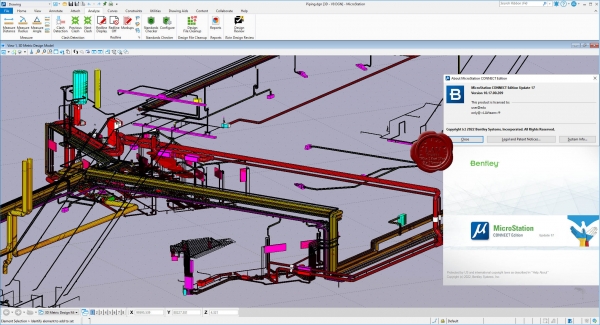
MicroStation - самая производительная, наиболее доступная и совместимая САПР-платформа для проектирования, строительства и эксплуатации мировой инфраструктуры.
Вам, вероятно, известно, что 95% инфраструктуры в мире проектируется, строится и поддерживается с применением файлов форматов DGN и DWG. При помощи MicroStation пользователи имеют возможность непосредственно редактировать содержимое обоих форматов файлов одновременно. Эта возможность превращает MicroStation в платформу для обеспечения совместимости, являющуюся обязательным атрибутом.
MicroStation также является платформой для инноваций, расположенной в центре полного спектра вертикальных программных приложений, обеспечивающей пользователей возможностью индивидуализации приложений с помощью VBA, а также возможностью "вертикального роста" при помощи узкоспециализированных решений для увеличения производительности при поддержании полной целостности данных по всему проекту.
С учетом лишь из этих двух соображений, то, что MicroStation используется всеми, включая архитекторов, инженеров, картографов и подрядчиков по проектам в области архитектуры, строительства и инженерного проектирования, не должно вызывать удивления. За счет этого данная система становится стандартом для лучших проектировщиков мира, являющихся участниками рейтинга ENR Global 150. |
| |
 Читать статью дальше (комментариев - 16)
Читать статью дальше (комментариев - 16)
| |
|
 |
 Автор: Williams Автор: Williams
 Дата: 5 июля 2022 Дата: 5 июля 2022
 Просмотров: 8 839 Просмотров: 8 839 |
| |
Autodesk Robot Structural Analysis Pro 2023.0.1
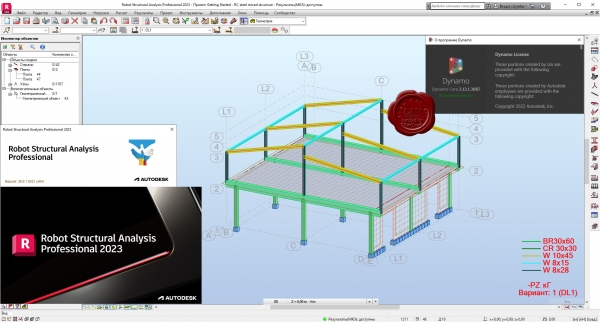
Autodesk Robot Structural Analysis Professional - программный комплекс для расчета строительных конструкций и сооружений на прочность, устойчивость и динамические воздействия. Расчет выполняется методом конечных элементов.
Программа имеет сертификат соответствия РОСС US.СП15.H00174 № 0842773.
Типы рассчитываемых конструкций:
- 2D- и 3D-стержневые элементы;
- пластины;
- оболочки;
- предварительно напряженные пластины;
- предварительно деформированные пластины;
- осесимметричные конструкции;
- разнородные материалы элементов конструкций;
- объемные твердотельные элементы.
Типы расчетов:
- статический линейный;
- динамические (модель, спектр, сейсмика);
- потеря устойчивости;
- гармонические колебания;
- кратковременная нагрузка;
- нелинейный расчет кратковременной нагрузки;
- продавливания;
- упруго-пластическая деформация;
- расчет вибрационного воздействия от жизнедеятельности человека;
- отклик-спектр;
- вантовые элементы;
- дополнительные диаграммы результатов расчетов.
Реализована свободная передача данных между Autodesk Robot Structural Analysis Professional и Revit Structure совместно с инструментами Revit Extensions для Revit Structure. Двусторонняя связь позволяет координировать процессы создания и расчета модели. Благодаря технологии BIM возможно своевременное обновление всех компонентов проекта, что позволяет быстро получать конструкторскую документацию.
Созданная расчетная модель и результаты анализа, полученные с помощью Autodesk Robot Structural Analysis Professional, передаются в AutoCAD Structural Detailing для получения деталировочных чертежей. Благодаря такой передаче данных конструктор может пройти все этапы - от проектирования до расчетов и создания деталировочных чертежей.
Мощный механизм генерации конечно-элементной сетки позволяет конструктору работать с большими и сложными моделями. Сетки создаются автоматически или с помощью ручной настройки параметров генерации. Для каждой отдельной поверхности можно задать индивидуальные параметры разбиения. Это помогает создавать сетки высокого качества для получения более точных результатов расчета.
Поддерживаются линейные и нелинейные методы расчета конструкций. Программа позволяет легко и эффективно осуществлять множество нелинейных методов расчета - например таких, как P-дельта анализ, расчет напряженно-деформированных элементов, расчет вант и пластичных элементов.
Модули Autodesk Robot Structural Analysis Professional, предназначенные для расчета железобетонных и стальных конструкций, включают более 40 типов марок стали и 30 типов железобетонных элементов. Программа упрощает процесс проектирования, позволяя выбирать необходимые сечения элементов из базы данных.
Быстрый динамический расчет может быть применен для конструкций любой сложности. Эффективные алгоритмы расчета Autodesk Robot Structural Analysis Professional оптимизированы для применения на многоядерных процессорах. |
| |
 Читать статью дальше (комментариев - 32)
Читать статью дальше (комментариев - 32)
| |
|
 |
 Автор: Williams Автор: Williams
 Дата: 4 июля 2022 Дата: 4 июля 2022
 Просмотров: 2 798 Просмотров: 2 798 |
| |
Bentley RAM Connection Standalone CONNECT Edition Update 7 13.07.01.05
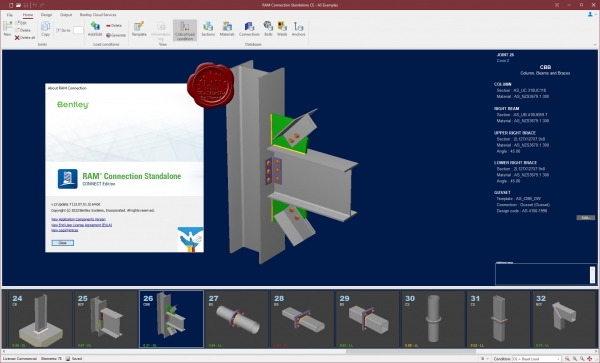
Легко реализовывайте высококачественные и экономичные проекты с использованием различных бетонных, стальных и балочных строительных конструкций. Проектируйте, анализируйте и создавайте документацию по вашим проектам зданий для экономии времени и средств. Максимально повысьте рентабельность ваших инвестиций в ПО благодаря полностью интегрированному набору приложений для комплексного анализа, проектирования и оформления документации для стальных и бетонных конструкций. Повышение вашей производительности за счет устранения утомительных и трудоемких задач с помощью практических приложений RAM. Любые виды проектирования: от отдельных компонентов до крупномасштабного строительства и фундаментов.
RAM Connection
Анализ, проектирование и мгновенная проверка всех типов соединений с комплексными расчетами и соблюдением сейсмических требований. |
| |
 Читать статью дальше (комментариев - 21)
Читать статью дальше (комментариев - 21)
| |
|
 |
 Автор: Williams Автор: Williams
 Дата: 3 июля 2022 Дата: 3 июля 2022
 Просмотров: 5 283 Просмотров: 5 283 |
| |
Bentley PLAXIS 2D & 3D CE V22.01 Russian Manual
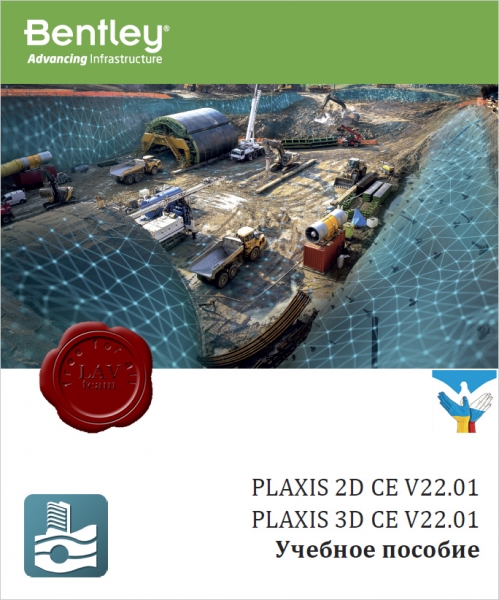
PLAXIS - программная система, основанная на методе конечных-элементов, используемая для решения задач инженерной геотехники, проектирования и инженерной геологии. Представляет собой пакет вычислительных программ для конечно-элементного расчёта напряжённо-деформированного состояния сооружений, фундаментов и оснований.
PLAXIS 2D. Выполняйте геотехнический 2D анализ деформаций и устойчивости с помощью PLAXIS 2D WorkSuite, мощного пакета инструментов для анализа методом конечных элементов и предельного равновесия, который включает специализированный функционал для анализа вибраций, грунтовых вод и теплового потока.
PLAXIS 3D. Выполняйте 3D анализ деформаций и устойчивости в своем следующем геотехническом проекте с использованием PLAXIS 3D WorkSuite. Он представляет собой пакет для анализа методом конечных элементов и предельного равновесия, который включает в себя специализированный функционал для анализа вибраций и грунтовых вод.
Команда Plaxis Ru проделала большую работу и перевела учебные пособия к новым версиям как для 3D так и для 2D, более того выложила мануалы в открытый доступ! |
| |
 Читать статью дальше (комментариев - 19)
Читать статью дальше (комментариев - 19)
| |
|
 |
 Автор: Williams Автор: Williams
 Дата: 2 июля 2022 Дата: 2 июля 2022
 Просмотров: 687 Просмотров: 687 |
| |
Applied Flow Technology Impulse v9.0.1102 build 2022.05.11
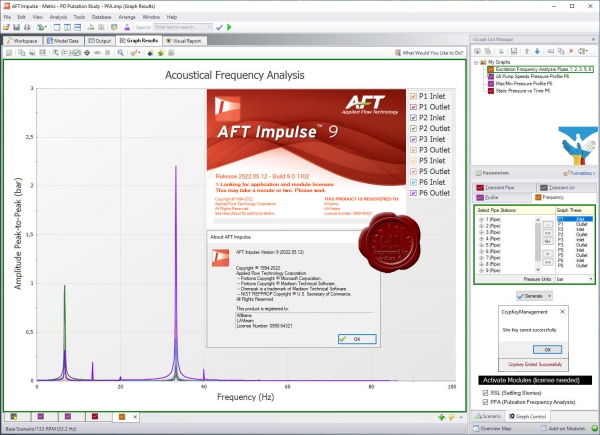
Applied Flow Technology Impulse - набор инструментальных средств предоставляющих возможность работы с моделью в интерактивном режиме через графический интерфейс, инструментарий включает встроенную библиотеку экспертных знаний по проблеме гидроудара. Applied Flow Technology Impulse позволяет создавать проект-дизайн системы трубопровода с большей степенью защищенности, надежности и безопасности исключая потенциально опасные эффекты гидроудара и других нежелательных неустановившихся режимов.
Primary Features of AFT Impulse
- Advanced transient solver based on Method of Characteristics.
- Built-in steady-state solver to automatically initialize waterhammer transient.
- Detailed pump inertial modelling for trips and start-ups including state-of-the-art, four quadrant methods.
- Built-in library of fluids and fittings.
- Models liquid column separation caused by transient cavitation.
- Extensive cavitation modelling.
- Scenario Manager to track all design variants and operational possibilities in a single model file with data linkage.
- Comprehensive relief valve modelling.
- Integrated graphing and reporting.
- Animation features to dynamically graph transients.
- Create video files from animations to share your results.
- Generates force imbalance files that can be automatically read into CAESAR II and TRIFLEX pipe stress dynamic models.
- Built-in intelligence to guide you in building better models.
|
| |
 Читать статью дальше (комментариев - 8)
Читать статью дальше (комментариев - 8)
| |
|
 |
 Автор: Williams Автор: Williams
 Дата: 1 июля 2022 Дата: 1 июля 2022
 Просмотров: 580 Просмотров: 580 |
| |
Applied Flow Technology Arrow v9.0.1109 build 2022.05.11
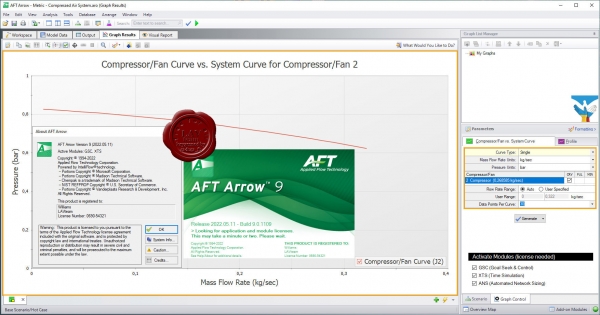
Applied Flow Technology Arrow - отличная программа для гидравлического расчета различных разветвленных сетей со сжимаемыми средами (включает также расчет теплопотерь). Осуществляет анализ системы при скоростях вплоть до звуковой (также включен анализ сети при звуковом ударе).
|
| |
 Читать статью дальше (комментариев - 5)
Читать статью дальше (комментариев - 5)
| |
|
 |
| ПОИСК ПО САЙТУ |
 |
|
 |
| КАЛЕНДАРЬ | | |
 |
| « Октябрь 2025 » |
|---|
| Пн | Вт | Ср | Чт | Пт | Сб | Вс |
|---|
| | 1 | 2 | 3 | 4 | 5 | | 6 | 7 | 8 | 9 | 10 | 11 | 12 | | 13 | 14 | 15 | 16 | 17 | 18 | 19 | | 20 | 21 | 22 | 23 | 24 | 25 | 26 | | 27 | 28 | 29 | 30 | 31 | |
|
 | |
| |
|